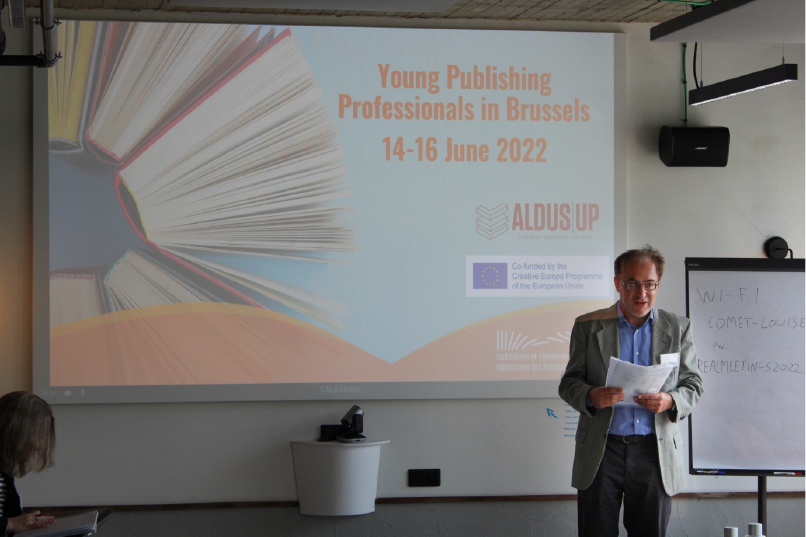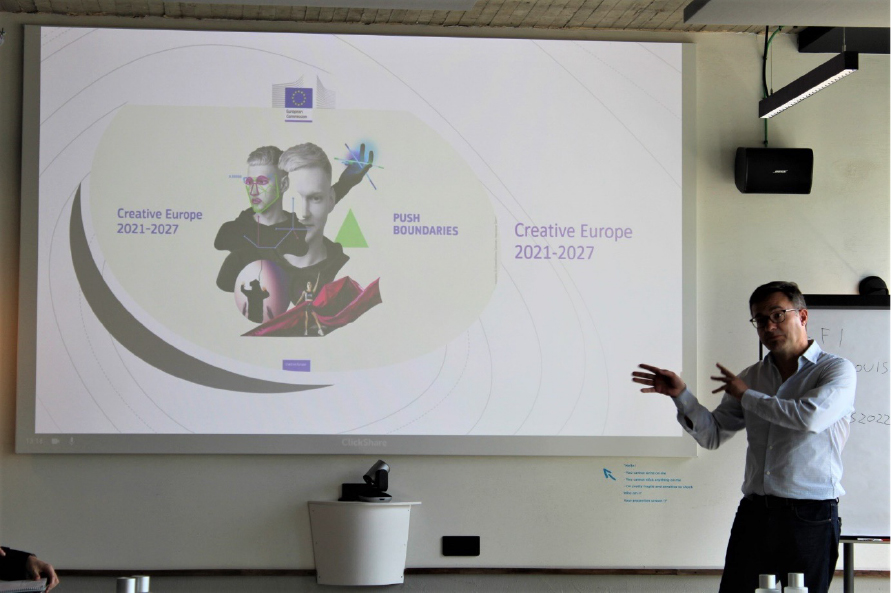Policy review: Quentin Deschandelliers
This piece is part of a series dedicated to the latest Young Publishing Professionals in Brussels event (YPPiB), taking place on 14th to 16th June 2022. Participants in the YPPiB initiative have the opportunity to visit Brussels and learn more about the European Book sector through activities such as: meetings with representatives of European institutions, dedicated workshopping and networking sessions, meetings with members of the European Parliament, and overall, the chance to confront and network with practitioners from all over Europe.
This piece follows a previous piece on the YPP initiative (available here), offering a more detailed report on Mr Gianpaolo Scacco’s presentation on policies impacting the book sector in Europe, and Mr Arnaud Pasquali‘s presentation on the various opportunities for European publishers offered by programmes such as Creative Europe and others. Lastly, as an example of such activities, we refer to the YPP collaboration with Möbius, an Horizon2020 project dedicated to innovation in digital publishing.
The status of the policies impacting the cultural and creative industries

DG EAC Gianpaolo Scacco
Mr Scacco (Cultural Policy Officer at the Directorate General Education, Youth, Sport and Culture – DG EAC) gave a presentation on the policies impacting the cultural and creative industries in the Union, including an overview on copyright policies. Policymakers’ current goal is the consistent application of rules in cooperation with Member States and stakeholders. The Directive on Copyright in the Digital Single Market is very relevant as it aims to ensure fairer remuneration for creators and rights holders, especially online. More specifically, Article 17 of the Directive sets out a specific regime for using creative works on content-sharing platforms. Mr Scacco remarked that the Commission had already opened several infringement procedures against Member States that did not implement the Directive yet.
Mr Scacco also discussed the Marrakesh Treaty and Marrakesh Directive. The former has the goal of facilitating access to print works for the blind, visually impaired, and print-disabled. The European Commission assessed the Directive (implementing the EU obligations under the Treaty) in a report, looking to possible extensions to types of works not covered by it.
Later, Mr Scacco discussed the Digital Services Act (DSA) and the Digital Markets Act (DMA). Both were adopted by the European Parliament on 5th July 2022 and will be applicable from 2023. The DMA aims to make digital markets fair and open by setting rules for platforms that act as “gatekeepers.” It will prevent platforms from imposing unfair conditions on businesses and end users and it will cover practices that have been particularly harmful to publishers. This includes data accessibility and inter-operability of gatekeepers’ services.
The DSA puts into practice the principle “what is illegal offline, is also illegal online”. It will reinforce the obligations of online services and platforms to ensure they address illegal content more effectively, combining specific obligations for online intermediary services with a strengthened supervisory framework, particularly for the largest online platforms. Better regulated aspects include harmonised notice and action procedures, privileged channels for trusted flaggers to notify infringements, single points of contact for service providers, traceability obligations for e-commerce platforms, and more.
In the end, Mr Scacco focused on the newly adopted directive on VAT rates. The directive updates the current rules governing value-added tax rates for goods and services. Its goal is to provide the Member States with more flexibility when applying VAT rates. Books and e-books will become eligible for super-reduced, or even 0% VAT in all the Member States.
The opportunities of the Creative Europe Programme relevant for publishers

DG EAC Arnaud Pasquali
Mr Pasquali’s (Programme Manager for Book sector, cooperation with the European Education and Culture Executive Agency on programme implementation and development –DG EAC) presentation covered the Creative Europe Programme and its relevance for publishers, highlighting the topic of transnational circulation of books as an important yet complex policy objective. The programme’s budget has been increased for the 2021-2027 period, reaching more than € 2.4 billion. The programme is informed by the 2018 Agenda for Culture, and it explicitly matches the Commission’s priorities regarding climate (A European Green Deal), equality (An economy that works for people), and technology (A Europe fit for the digital age) especially.
According to Mr Pasquali, the programme has been improved with the introduction of multi-annual contracts, the use of e-grants, of lump sum contributions, and increased pre-financing and co-financing. The new Creative Europe is characterised by an emphasis on horizontal approaches with cross-sectoral initiatives, internationalisation, synergies, and increased mobility of creatives. The programme also echoes the targets set by the Open Method of Coordination on Translation.
The Creative Europe programme consists of strands: Culture, Media, and Cross-sector. The Culture strand is particularly relevant for publishers, as it helps cultural and creative organisations to operate transnationally, promoting the cross-border circulation of works of culture and the mobility of cultural players. The Culture strand contributes to a diverse range of topics, such as Resilience and recovery of the cultural and creative sector hit by the pandemic crisis and Cooperation and exchanges of best practices.
Two actions under Culture were given particular attention: European Cooperation projects and Circulation of European literary works. Cooperation projects can go from small-scale (at least 3 participants) to large-scale (at least 10 participants).
Cooperation projects focus on either creation (strengthening the transnational creation and circulation of European works and artists) or innovation (enhancing the capacity of European cultural and creative sectors to nurture talents, to innovate, to prosper, and to generate jobs and growth).The action’s priorities are: audience engagement and development, social inclusion through culture, sustainability (Green Deal, including the New European Bauhaus), new technology (digital transformation), and international dimension. Sector-specific priorities include capacity-building activities – such as training, networking, or market access activities. Mr Pasquali remarked that the next call for Cooperation projects would open in October/November 2022.
The Circulation of European literary works action focuses on strengthening the transnational circulation and diversity of European literary works, by encouraging translation and promotion of books in lesser-used languages (those other than English, German, French, Spanish and Italian). The aim of the action is to reach 450-500 translated titles each year, with € 5 million available. The overall goal is to reach new audiences for European literary works, in the EU and beyond, and to strengthen the competitiveness of the European book sector encouraging cooperation within the value chain. Proposals under the action can also include business-to-business “export” activities to foster the sales of translation rights in Europe and beyond.
Each proposal under the action must be based on a sound editorial and promotional strategy, covering a package of at least 5 eligible works of fiction (and at least 21 for large scale proposals), translated from and to eligible languages. The last iteration of the programme resulted in 3500 books translated and promoted through 380 grant projects funded with € 24 Million. The action now features an increased attention to the circulation and promotion of the titles, as well as a higher co-financing rate of 60% and an increased pre-financing of 80%. Also, it is now possible to apply as a group of publishers.
Mr Pasquali also mentioned instruments such as Versopolis, the platform for European poetry, or the European Book Week, which encourages agencies, organisations, and booksellers to implement events in their countries to support reading promotion, possibly featuring foreign literature. Lastly, he presented support schemes aimed at individual creatives, including mobility schemes or the European Union Prize for Literature.
After the presentations, the young professionals worked on the Horizon 2020 project Möbius: Möbius’ partner Imec-Smit hosted an interactive survey on the project’s Prosumer Intelligence Toolkit, an instrument meant to monitor activities and trends in online communities of prosumers (readers, fanfiction writers, etc). Aldus Up recently partnered with Möbius, and you can read more about the project here: Möbius – The power of prosumers in publishing (mobius-project.eu)

















